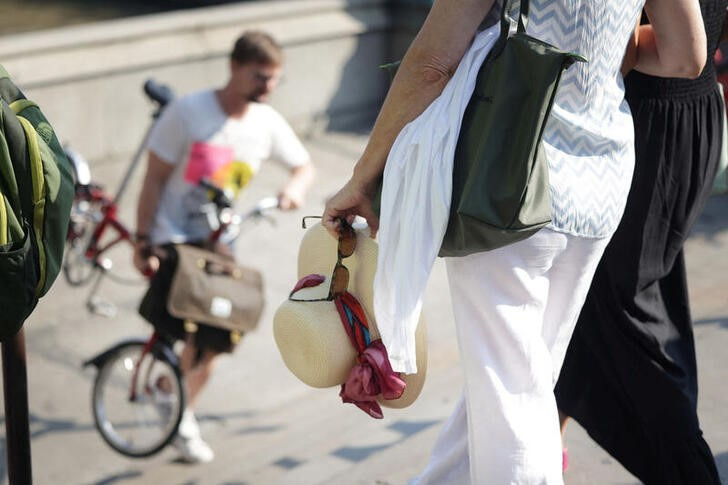By David Milliken
LONDON (Reuters) -British retail sales fell more than expected in September as shoppers avoided buying autumn clothing during unseasonably warm weather, against a backdrop of broader cost of living pressures that could see the economy shrink overall in the third quarter.
Retail sales volumes dropped by 0.9% on the month after a 0.4% rise in August, the Office for National Statistics (ONS) said on Friday, a much bigger decline than the 0.2% fall economists had forecast in a Reuters poll.
"It was a poor month for clothing stores as the warm autumnal conditions reduced sales of colder weather gear. However, September's unseasonable warmth did help drive up food sales a little," ONS Chief Economist Grant Fitzner said.
Britain experienced its joint-hottest September on record last month, part of a heat wave which clothing retailer H&M said had depressed sales across much of Europe.
Over the third quarter as a whole, sales volumes fell 0.8% - the biggest drop since the three months to the end of February, and one exacerbated by an unusually wet July which upset normal summer spending patterns.
Overall, the ONS said the weak retail performance was likely to reduce quarterly gross domestic product growth by 0.04 percentage points - a meaningful amount when the economy grew by just 0.2% in the second quarter.
"The sharp fall in retail sales in September makes it increasingly likely that GDP flatlined or even fell in September. That would mean that GDP as a whole contracted in Q3," said Thomas Pugh, an economist at accountants RSM UK.
Sterling weakened slightly against the U.S. dollar after the data.
COST OF LIVING SQUEEZE
Clothing sales volumes fell 1.6% in September, and household goods stores recorded a 2.3% monthly drop in sales - the biggest so far this year - which the ONS attributed to ongoing cost of living pressures.
British households have faced a cost-of-living squeeze over the past two years due to supply-chain difficulties and labour shortages after the COVID-19 pandemic, amplified by a surge in energy costs after Russia invaded Ukraine.
While retail sales volumes surged in mid 2021 when shops fully reopened in Britain after COVID-19 restrictions, purchases have steadily fallen since and for the past year sales volumes have been below pre-pandemic levels.
Friday's data showed that the volume of goods bought in September was 3% lower than in 2019, despite shoppers spending 17% more.
Overall consumer price inflation in Britain was an annual 6.7% in September, the highest of any major advanced economy.
Prospects look murky as retailers enter the key pre-Christmas season, when many make the bulk of their profits.
Data from Britain's longest-running consumer sentiment survey, published by GfK earlier on Friday, showed a slump in morale in October, and a particular unwillingness to splash out on big-ticket items.
On Monday accountants PwC published a report showing that nearly a third of Britons planned to cut back on Christmas spending this year, mostly due to higher food and energy costs.

However, online commerce platform Shopify (TSX:SHOP) said that although nearly three quarters of shoppers had cut back on discretionary spending in the past couple of months, most were saving more than a year ago to allow for extra Christmas spending.
"Despite fears that the run up to Christmas is a challenging time for retailers, data indicates we could see retail footfall increase, both online and offline," Shopify's managing director for Europe, the Middle East and Africa, Deann Evans, said.